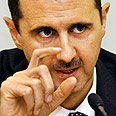
President Assad
Photo: AFP
Syrian President Bashar Assad
vowed to keep supporting Hizbullah
and Hamas despite US pressure on Syria to stop backing the groups, Baath Party members familiar with a speech the Syrian leader gave on Wednesday said.
Assad was speaking at the start of a two-day conference of the ruling Baath Party central command, which is expected to set a date before July for a referendum on the renewal of the president's seven-year term.
Strengthening the Enemy
Itamar Eichner
Syria continues to transfer advanced antitank missiles to Lebanese Shiite group, in defiance of UN resolution, Jerusalem officials say. 'Hizbullah is again growing in strength before our eyes, and we're doing nothing about it," official claims
"The president was clear that Syria's support for the two movements will continue and that their resistance to regain occupied land was a legitimate right," Baath Party member Mostafa al-Meqdad told Reuters.
Washington imposed sanctions on Syria in 2004, mainly for backing the two groups and threatened in September to widen the embargo.
Members of Hamas' leadership, including the group's leader Khaled Mashaal, live in exile in Syria. Hizbullah is attempting to oust Lebanon's Western-backed government, which it views as unrepresentative.
Washington accuses Damascus of causing instability in Lebanon. Syria, which pulled its forces from Lebanon in 2005 under pressure, denies interfering in Lebanese affairs and says it supports efforts to reach a deal that involves giving Hizbullah's bloc more ministers in the cabinet.
"President Assad told the conference Lebanese unity must be preserved," Another Baath Party member said. State news agency SANA said Assad told delegates the key to Middle East stability was a comprehensive peace deal that returned all Arab territory occupied by Israel since 1967, including the Syrian Golan Heights.
Referendum
The 41-year-old president, who succeeded his late father, Hafez Assad, in 2000, is expected to win the referendum easily. His rule has been marked by a slow liberalization of the economy and deteriorating ties with the United States, Israel's chief ally.
Assad said there would be no major changes to the policy of gradually opening the economy to private investment while maintaining a public sector that employs hundreds of thousands of people.
Assad gave no indication that the Baath Party, which has monopolized power since mounting a coup in 1963, would allow opposition parties to operate in the country.















